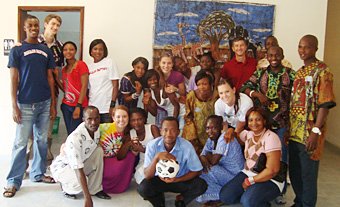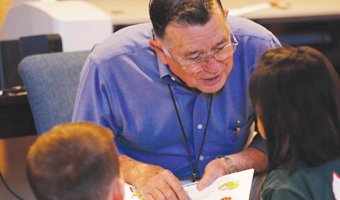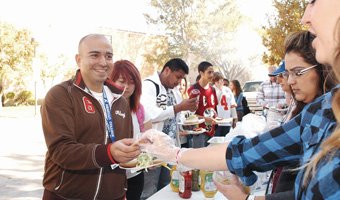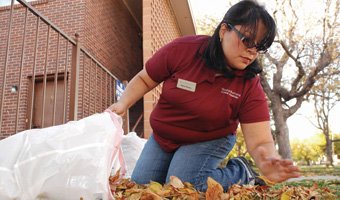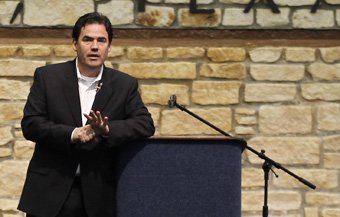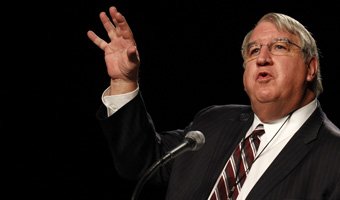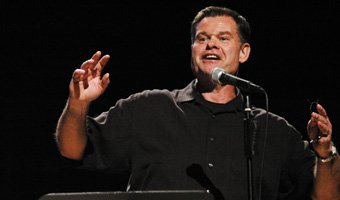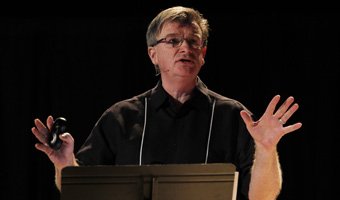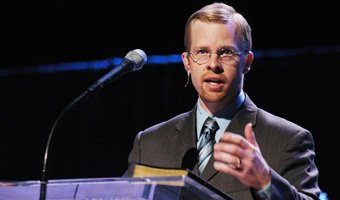By Ken Camp
AMARILLO—Texas Baptists sorted shoes for a charitable ministry, cleaned and repaired a transitional home for single mothers, cooked burgers for college students and distributed books to children during their time in Amarillo.
But while the “Igniting Hope” theme rallied volunteers for service and served as a unifying theme for workshops, another theme took center stage during business sessions at the Baptist General Convention of Texas annual meeting.
Newly elected BGCT officers are President Jerry Carlisle (center), pastor of First Baptist Church in Plano; First Vice President Jeff Johnson (left), missions strategist and former pastor of First Baptist Church in Del Rio; and Second Vice President Byron Stevenson (right), pastor of The Fort Bend Church in Sugar Land. (PHOTOS/Robert Rogers)
Throughout the business meetings, questions about how the state convention will fund and relate to institutions dominated much of the discussions.
Messengers to the annual meeting approved a flat $33.85 million budget for 2012, rejecting an attempt to restore more than $890,000 Baylor University loses next year.
However, messengers approved a renegotiated agreement with Baylor University that gives Baylor greater influence in determining the composition of its governing board. (See related story .)
They also approved a constitutional amendment reducing the percentage of governing board trustees for affiliated institutions elected by the BGCT from 75 percent to a simple majority.
After several messengers questioned the necessity of the move and asked to hear from institution presidents, both Lanny Hall, president of Hardin-Simmons University, and
Gary Cook, president of Dallas Baptist University, spoke in favor of the amendment.
Based on a new way of determining financial support for educational institutions related to the BGCT, the 2012 budget reduces total BGCT financial support for Baylor from about $2.8 million to $1.9 million. Excluding funding for Baylor’s Truett Theological Seminary—which remains at about $1.1 million—BGCT support for Baylor decreases from more than $1.72 million in 2011 to $831,175 in 2012.

Bruce Webb, pastor of First Baptist Church in The Woodlands, introduced a motion to amend the budget recommendation by restoring Baylor University to its 2011 funding level, using investment funds to make up the difference.
The new funding approach provides a $625,000 base amount of support to all BGCT educational institutions, and it provides funding to all schools for ministerial education. However, a prorated grant based on student enrollment—an approach that particularly benefited Baylor as the largest school related to the BGCT—now is limited to affiliated institutions. It does not provide those funds to schools that relate to the convention by special agreement, namely Baylor and Houston Baptist University.
Bruce Webb, pastor of First Baptist Church in The Woodlands , introduced a motion to amend the budget recommendation by restoring Baylor to its 2011 funding level, using investment funds to make up the difference.
Webb noted his support for the way the new funding approach provides additional money for other institutions, but he called a nearly $900,000 cut in funding for Baylor “drastic” and predicted a backlash.
“This is going to affect us negatively,” he said. “We’re going to lose far more money than we would gain.”
BGCT Treasurer Jill Larsen reported the projected 2012 operating budget already includes all the investment income from endowments that prudently could be anticipated.
Charlotte Young from First Baptist Church in Dimmitt, chair of the Executive Board’s institutional relations committee, spoke against the amendment.
“In no way was this intended to be a punitive measure” toward Baylor, Young insisted. Rather, it was a “fair and equitable way” of dealing with all institutions that relate to the BGCT.
Kyle Morton, pastor of First Baptist Church in Port Arthur, asserted the funding cut should not happen at the same time as a change in the BGCT and Baylor relationship agreement, nor should a new executive director have to deal with the public relations fallout from decreasing financial support for Baylor.
“This may be a good idea, but the timing stinks,” he said.
Steve Wells, pastor of South Main Baptist Church in Houston, reminded messengers the BGCT is not “defunding Baylor,” contrary to public perception.
“If anybody wants to defund me by giving me $2 million, I will welcome the gift,” he quipped.

Messengers to the annual meeting approved a flat $33.85 million budget for 2012, rejecting an attempt to restore more than $890,000 Baylor University loses next year.
After the motion to restore funding to Baylor failed, Ed Jackson from First Baptist Church in Garland introduced an amendment to the budget stipulating that any overage at the end of 2012 in Cooperative Program giving be divided equally between the BGCT evangelism department and Texas Baptist institutions according to the distribution formula. The amendment passed.
In other business, messengers to the annual meeting:
• Elected as officers President Jerry Carlisle, pastor of First Baptist Church in Plano; First Vice President Jeff Johnson, missions strategist and former pastor of First Baptist Church in Del Rio; and Second Vice President Byron Stevenson, pastor of Fort Bend Baptist Church in Sugar Land.
• Voted in favor of a constitutional change giving the Executive Board authority to adopt the annual budget every fifth year, when the annual meeting is held in the summer rather than the fall. As a constitutional amendment, it will require approval by messengers at two consecutive annual meetings.
Last year, BGCT messengers approved a study committee proposal regarding ways to increase involvement in the annual meeting. One recommendation focused on holding the meeting in the summer once every five years in conjunction with the Hispanic Baptist Convention of Texas and the African-American Fellowship, rather than in the fall. The first summer event is scheduled for July 14-17, 2013, in San Antonio.
• Approved a constitutional amendment allowing mission congregations to be considered as churches for the limited purpose of sending four messengers to the annual meeting, provided it contributes to the BGCT, practices the ordinances of a church, addresses a specific mission need and identifies, aligns and generally endorses the convention’s work.
• Rejected a constitutional amendment that would have given full voting membership on the BGCT Executive Board to the presidents of convention-recognized fellowships. Instead, the convention voted in favor of a motion to grant voting rights to the presidents provided they are “supportive of the BGCT.”
The annual meeting drew 983 messengers and 568 registered visitors.
CORRECTION: The original cutline for the newly elected officers photo erroneously listed the convention's new first vice president as Jerry Johnson, rather than Jeff Johnson. It has been corrected.
